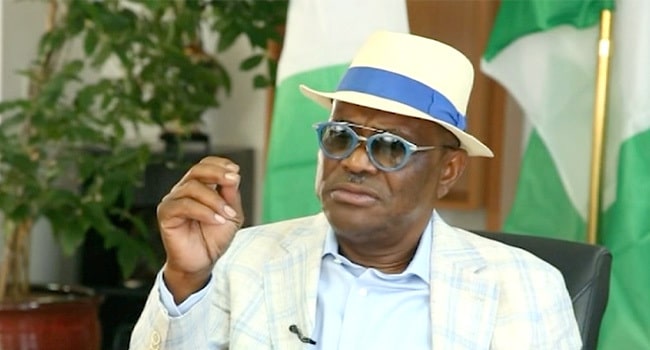Nyesom Wike has declared war on Abuja Street Beggars.
NewsOnline Nigeria reports that Federal Capital Territory FCT Minister, Nyesom Wike has declared war on street beggars in the Federal Capital City FCC, lamenting their influx and saying criminal elements now disguise as beggars, making the job of providing security difficult.
Accordingly, he has given them till Sunday night to quit the city or risk security clampdown.
Wike spoke on Tuesday during the flag-off of the construction of an access road from Ring Road 1 by N16 to the Judges Quarters as well as the construction of internal roads within Judges Quarters in Katampe District.
ALSO: FG To Exempt Pads, Baby Products, Others From VAT In Proposed Nigeria Tax Act
He said; “In terms of security, let me say it clearly now. We have declared war. Abuja is returning to beggars’ city. I mean, if you know you have a sister, you have a brother who is a beggar on the roads, from next week, we will carry them. We will take them out (of the city). I mean, it is embarrassing that people who come in, the first thing they see are just beggars on the road. Sometimes too, they may not be beggars. They may be criminals pretending to be beggars. We will not allow that.
“So, I am giving a public order; from now till Sunday is the grace period. From Monday, we will pack them out. Let us know that we have a city that we can call a city. It is very embarrassing. We are fighting insecurity, and people will carry plates as if they are…, maybe they will be informants.
“So please, have it at the back of your mind that it is not only infrastructure that we are providing. We want to give you good security so you can sleep well with your two eyes closed.
“I know that some of you may not be happy. Sometimes we don’t need to make you happy. Sometimes we don’t need to. What is important is that we must do our work. If you are not happy, there is nothing we can do. The security and well-being of the people are key and that is why I have told the National Assembly members that for us, we will do everything that is required to continue to make sure that people will know that the National Assembly is doing all they can do to support. Their role is to pass the budget on time. Ours is to implement. And I know that by 2025, they will also give all their support, because I know they will always stand to approve our budget”.
The 2.7 kilometre network of roads will also see the FCT Administration providing engineering infrastructure involving power and water supply as well as stormwater drainage facility.
Disclosing that the project will be ready for commissioning by May next year, Wike added that his Administration will continue to touch other sectors and as well carry the Area Councils along.
He said; “A lot of people have said that we are concentrating on Abuja centre. That is not correct. As I speak to you, on Thursday, we will be at the Area Councils. We will be in Gwagwalada, we will be in Kwali.
“This December, we are commissioning six roads that will total about 65 kilometres in the Area Councils. So, anybody who is saying that we are concentrating in the city is not saying the truth. The truth is that the attention we give to the city is also the attention we give to the Area Councils. But of course you know, it is the city that tells you how the place will be. If foreigners come to the city and the city does not look good, it gives them the wrong impression. If the city does not look good, you can imagine what will happen in the rural areas.
“Let everybody know that we owe a duty to make sure Abuja competes favourably with other cities of the world”, he added.
Flagging off the project, House Speaker Tajudeen Abbas said the development of infrastructure in the FCT is not only an economic necessity but also a reflection of national aspirations.
Represented by the Deputy Speaker, Benjamin Kalu, the speaker said it is common knowledge that Nigeria, like many other developing nations, has an infrastructure deficit.
“According to recent estimates, Nigeria needs to invest about $3 trillion over the next 30 years to close the infrastructure gap and achieve the level of development required for sustained economic growth.
“The road network, power supply, housing, healthcare, and education sectors are some of the areas in urgent need of attention.
“Here in Abuja, the infrastructure deficit is more glaring as the city’s population continues to grow at an annual rate of 5%. This puts pressure on existing facilities and highlights the need for more access roads, housing, and essential services to cater to the needs of residents.
“Under the leadership of President Bola Ahmed Tinubu, there have been commendable initiatives aimed at addressing this infrastructure deficit”, he added.













